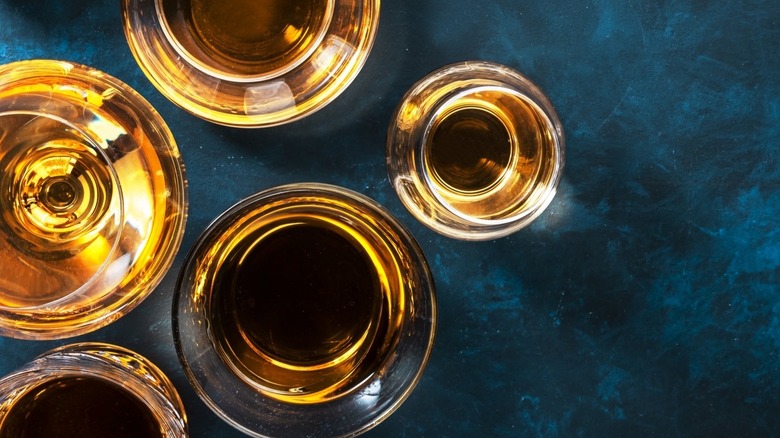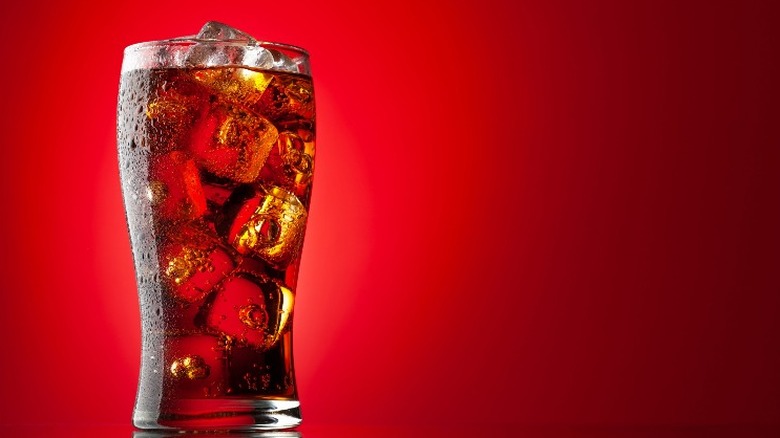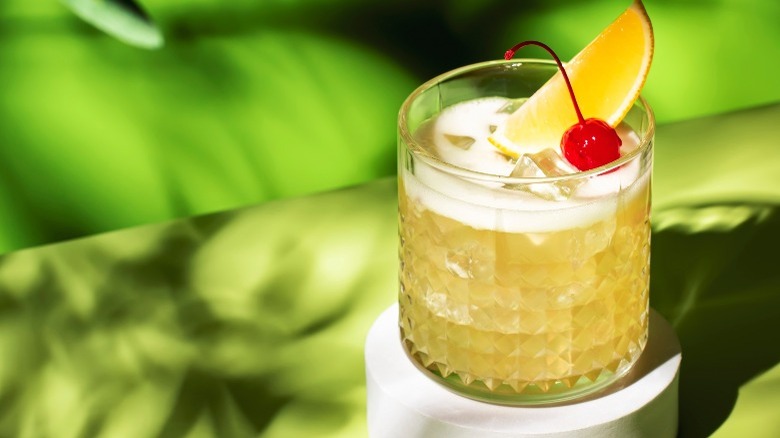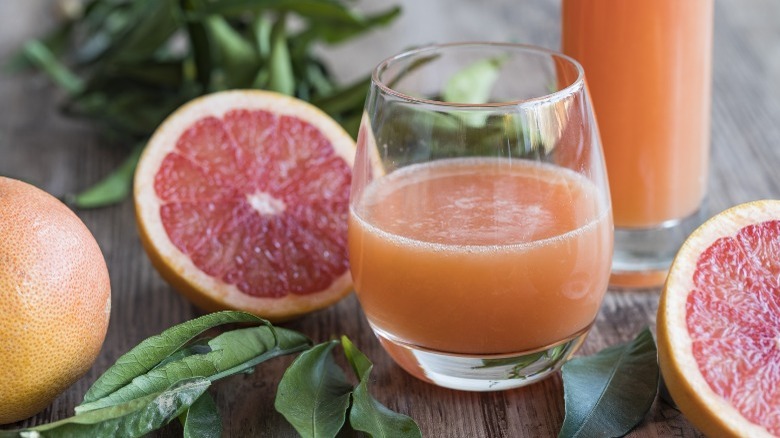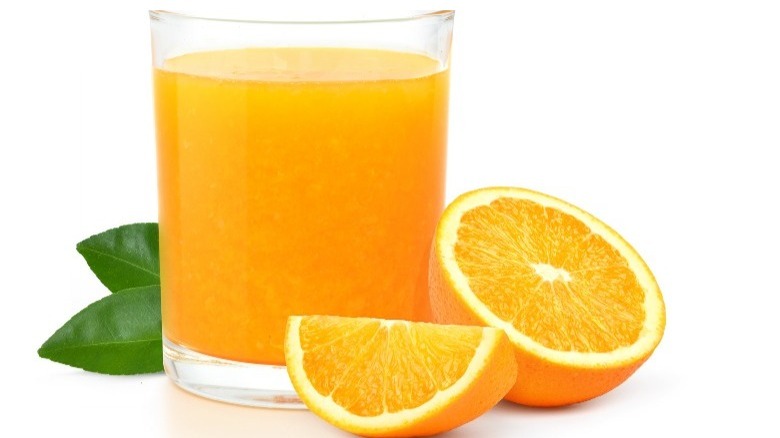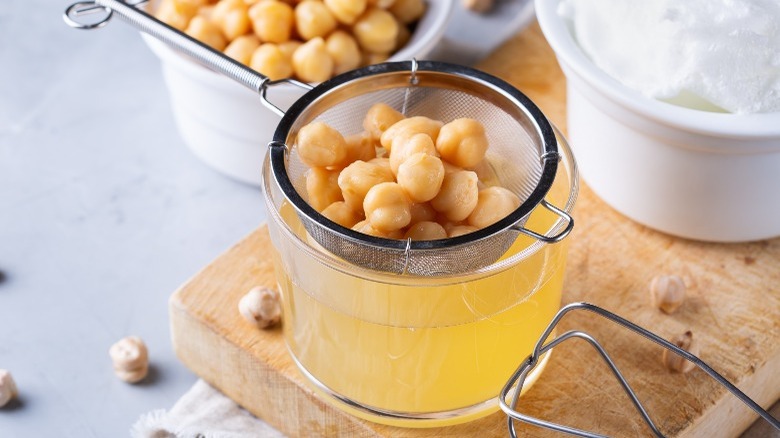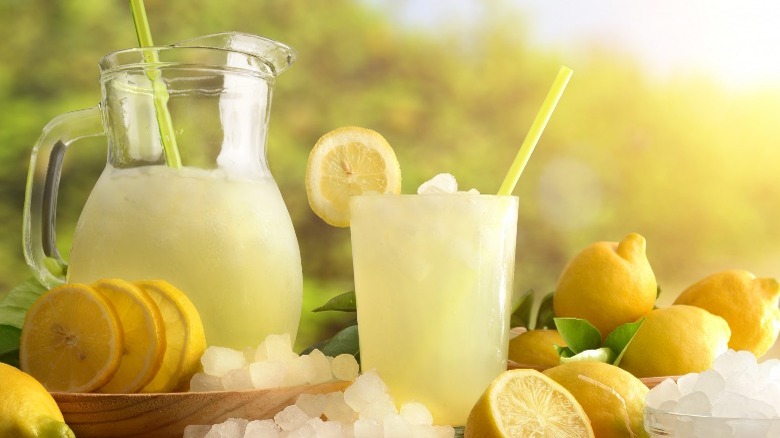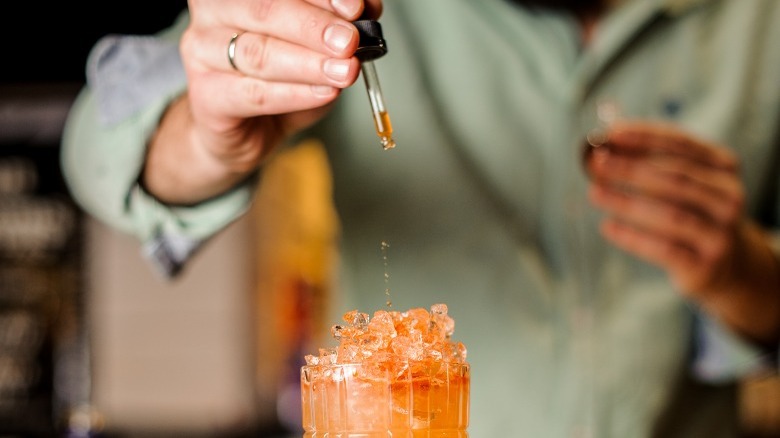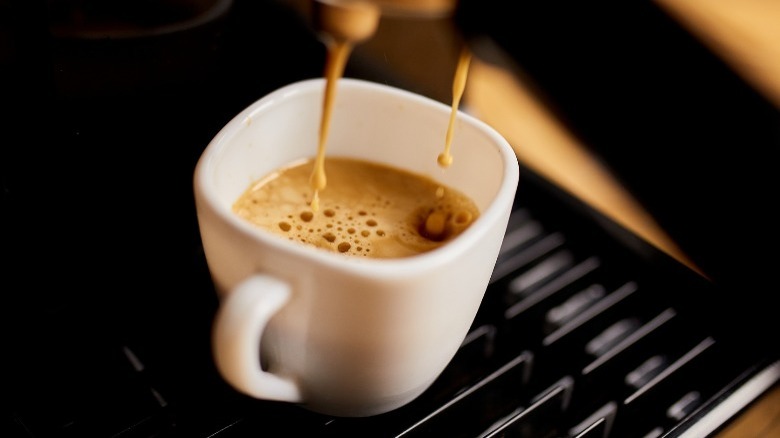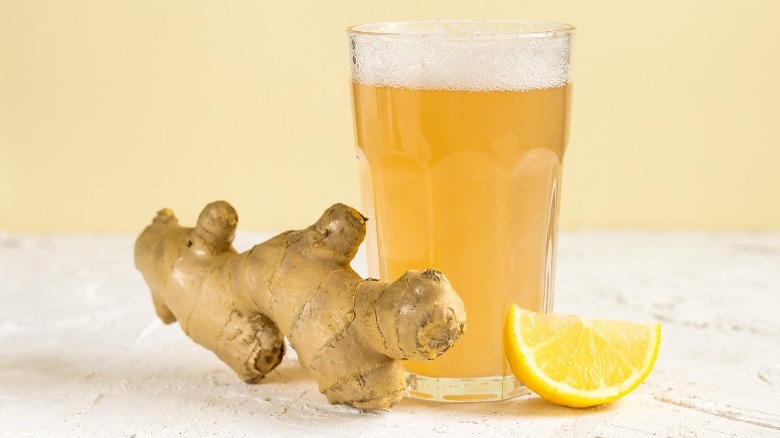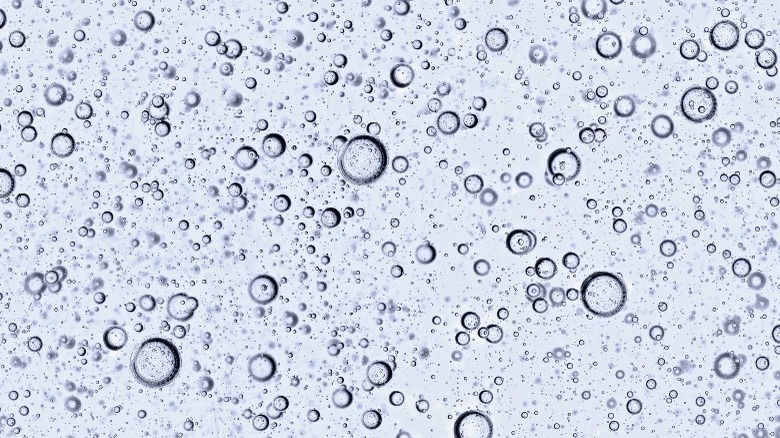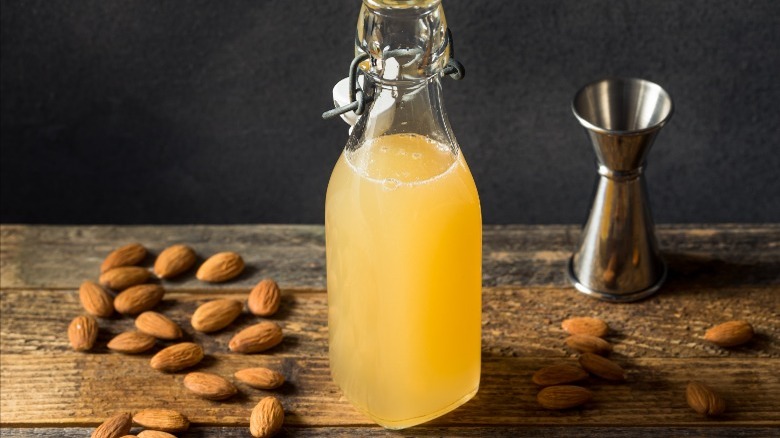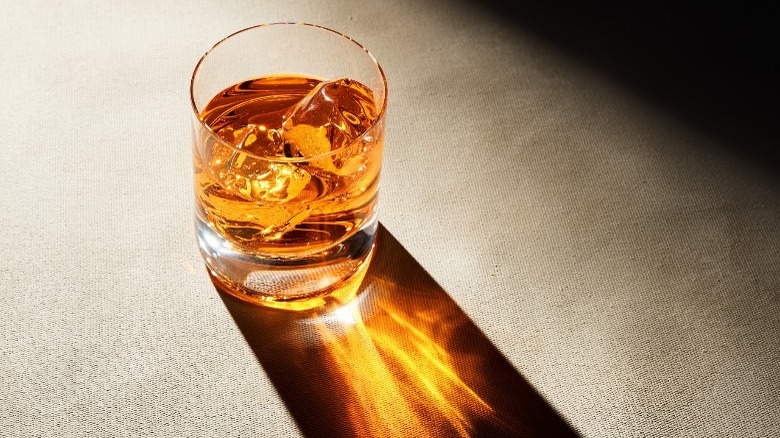12 Best Drinks To Mix With Scotch, Ranked
There's whiskey, and then there's Scotch whisky. (The different spellings are intentional; the one that's used is based on the location of origin.) Of the different types of whiskey, Scotch is likely the original iteration of it, as the name whisky is derived from an old Scottish Highlands Gaelic phrase meaning "water of life." Today, Scotch is distilled and aged in a similar process as most other whiskeys — which all use a variety of grains for the base — with the differentiator being that it was initially produced with malted barley. It's this ingredient that makes Scotch unique in the wide spectrum of whiskeys.
While Scotch develops earthy and vanilla flavor notes just like any spirit aged in oak barrels, it is generally considered to have a smokier taste than other whiskeys. That's because when the base grain of barley is malted under a fire in Scotland, it's the smoke of burning peat that ultimately adds that flavor to the final product. According to Whisky Magazine, peat — which is essentially rotting vegetation that develops over marshlands — is characteristic of Scotland because trees and coal resources were scarce, and peat was used as a fuel source for fire instead.
With Scotch's distinct flavor profile — including varying degrees of peatiness across all Scotches, of course — you may want to complement that taste with another liquid before it hits your palate. We've ranked some of the best drinks to do just that.
12. Coke
Scotch and Coke has become a popular order at bars, for this combination of smoke and cola nut-infused sweetness has been embraced by the masses in recent decades. But according to The New York Times, mixing Scotch wasn't always accepted. For centuries, Scotch has been a proudly produced spirit that was intended to be enjoyed on its own. However, those are the sentiments of an older generation. As younger people discovered Scotch, they'd mix it with a familiar soft drink, Coca-Cola — much to the chagrin of older Scotch drinkers.
Tastes evolve as humanity endures over the decades, so the Scotch and Coke combination is here to stay, at least for the time being. Scotch producers have yielded on their purist views, if only because it continues to make their product profitable in an ever-changing market. Some older gentlemen are also okay with it, as long as Scotch isn't the secondary mixer to a base of Coke. It will forever be "Scotch and Coke," not "Coke and Scotch" — unless times change yet again.
11. Sour mix
Like the soft drink standby Coca-Cola, the addition of an opposing flavor can complement the peatiness of Scotch. Such is the case with old school sour mix, bringing tartness to the overall flavor. However, sour mix — a pre-mixed concoction of factory-produced citrusy sour flavor and sweetness — is also of an older generation. Its origins date back to the 17th century, when citrus fruit juices — which helped stave off scurvy — were added to spirits that sailors drank for some sort of hydration since clean drinking water wasn't available. Eventually, the sour taste with added sugar became a mainstay in imbibing spirits, from rum to Scotch.
By the 1980s, pre-made sour mix was being churned out and bottled with an assembly line mentality, akin to fast food. However, it still exists on liquor store shelves for a hassle-free, almost instant way to create the trifecta of sweet, sour, and smoke in a Scotch sour.
10. Grapefruit juice
Since using fresh ingredients has become the preferred method of food and drink preparation by chefs and bartenders everywhere, simple syrup — which is equal parts sugar and water — and real citrus fruit juices have replaced the pre-made bottles of sour mix for the modern mixologist. There are several citrus juices out there to choose from, but one juice that has the perfect amount of sourness is grapefruit juice. The tartness of grapefruit juice complements Scotch so well, it's actually the main mixer in the classic cocktail, the Penicillin.
Not only that, grapefruit has plenty of health benefits. There are 76 milligrams of vitamin C per grapefruit, and grapefruit juice helps flush out toxins, boost internal efficiency, and improve bodily function. Many people know the grapefruit as a "miracle fruit," and it just might be exactly that. It could actually help you detox while you simultaneously "tox" with your Scotch.
9. Orange juice
A sweeter citrus juice than grapefruit, orange juice has a familiar fruitiness that can do to smoky Scotch what it does to champagne in mimosas: add some dimension. Not only that, but it can also add some viscosity if you opt for fresh orange juice with pulp. In fact, the more pulp, the better for you. That's right; that texture that some people find off-putting in their mouth is ironically beneficial to their bodies.
Pulp brings not only more fiber to orange juice, but more flavonoids (which might sound like it has something to do with flavor, but doesn't). Flavonoids, according to LiveScience, are plant compounds with antioxidant properties that help maintain weight, lower cardiovascular disease risk, support brain function, regulate blood sugar and blood pressure, and even help prevent cancer and other diseases. That's actually a lot of health benefits, so you might as well use pulpy orange juice when you're making that fresh Scotch sour.
8. Aquafaba
A classic sour cocktail, Scotch-based or otherwise, is usually topped with a layer of foam, typically created by whipping egg whites until they are aerated and fluffy. Some recipes "cheat" by using whipped unsweetened cream as a substitute, but one lesser-known (and increasingly popular) alternative is aquafaba.
Aquafaba is water that's been infused and thickened by way of soaking chickpeas in it. It's probably not something you wouldn't normally drink on its own, but it works well as a mixer. You can certainly make it on your own if you have time on your hands, but know that aquafaba is readily available in any can of chickpeas. That's right, don't dump the brine from a can of garbanzos. Save it to use as a drink ingredient. Use a hand blender to start the whipping process and you should have creamy foam in about five minutes. Add an upper layer of it on your Scotch sour — but beware of the aquafaba mustache when you drink it.
7. Lemonade
Citrus fruits and their juices don't have to be used to turn Scotch, or any whiskey for that matter, into a sour cocktail all the time. As the saying goes, if life gives you lemons, make lemonade — but then spike it. The popular summer drink sold by kids at sidewalk stands everywhere has also been used to make adult versions many, many times, typically by mixing it with clear spirits, like vodka, tequila, or gin. However, while Scotch is a spirit that has less of a neutral taste, it should be right on that roster as well. Lemonade already inherently has both taste components of sweetness and tartness, so adding the element of smokiness — along with the notes of a wood barrel finish — would only make the final concoction a well-rounded refreshment. Also, Scotch's ABV will give it that "adults only" kick you might need. Serve it with ice and enjoy it with your adult friends.
6. Bitters
Sour and sweet aren't the only complementary tastes for Scotch. Bitterness can also balance out the inherent flavor notes hailing from Scotland. In the cocktail world, one primary means of incorporating that element of taste is by adding aptly-named bitters to the glass. There are cocktail tincture bitters, which are highly-concentrated infusions of bark, citrus rinds, and/or other ingredients, and simply adding a drop of two of them will do wonders to a cocktail flavor profile. But there are also digestive bitters, like Italian amaros, which are fully infused spirits that can be enjoyed on their own or mixed with your Scotch (per Vinepair).
Depending on which digestif you use, the flavors of Scotch can be led in many directions. According to our round-up of amaros, adding Varnelli Amaro Dell'Erborista will add a bitter element with notes of thyme and anise. Averna Amaro will add hints of mint and cola. Nonino Amaro, meanwhile, brings caramel and orange peel. Whatever digestif you decide to mix with Scotch, it promises to be the perfect ending to a meal.
5. Coffee
If you know Irish coffee, you know that adding Irish whiskey to coffee is a flavorful way to spike that caffeinated go-to. Using Scotch whisky instead can add some smoky notes to that medium roast, and even bring balance to that caffeine high. (It can certainly lower that high too, depending on your ratios.)
However, you should know there's more to creating this hot alcoholic beverage than simply adding Scotch, or any whiskey, to coffee. Most people treat its process as an afterthought when it should actually be well thought out with specific ingredients. For the perfect Irish (or Scottish) coffee, the brew should be fresh, with two parts coffee per one part whiskey, and should only be sweetened with demerara sugar and topped with runny, freshly whipped cream — none of that canned stuff. If you care about the quality of your Scottish coffee, don't skimp on your ingredients for a delicious, yet buzzy pick-me-up.
4. Ginger beer
Ginger beer is one of the main components of a Moscow Mule cocktail (alongside vodka), and it's proven to be versatile when mixed with other spirits. Mix it with tequila and you have a Mexican Mule. Blend it with bourbon, it's a Kentucky Mule. Add it to gin for a Gin-Gin Mule. And no rum-based Dark & Stormy is complete without one part of ginger beer.
Scotch also plays well when it comes to mixing it with this non-alcoholic brew. Add one part Scotch, one part ginger beer, then add some lime juice and serve over crushed ice. Voila — you've got a Scottish Mule. Garnish with mint leaves.
When making a mule, Scottish or otherwise, it's important to use ginger beer and remember that it's different from ginger ale. The latter is merely carbonated water, flavored with ginger flavor. Ginger beer, on the other hand, is actually brewed with fermented ginger, water, and a starter culture. This gives ginger beer a spicier edge over ginger ale, which is merely just a soft drink. In fact, it's the ginger beer's jolt of spice that provides the "kick" of a mule.
3. Seltzer
While pre-made hard seltzers are all the rage these days, you can easily make your own by spiking carbonated water — SodaStream made or otherwise — with any spirit, and that includes Scotch. In fact, Scotch and soda is another popular, yet simple order at cocktail bars. Unlike Coke, it's a neutral, flavorless fizzy drink that does little to Scotch's intrinsic flavors, save for some dilution.
The benefit of sparkling water is that it automatically makes any drink refreshing to the mouth, providing an effervescent texture with every sip. However, not all fizzy water is the same. According to Healthline, there are differences between seltzer, club soda, sparkling mineral water, and tonic water. If you want that bitter taste of quinine —the taste characteristic of a gin and tonic — go for tonic water. Club soda and sparkling mineral water both contain sodium and may taste slightly salty, depending on the brand. The only true neutral sparkling water is seltzer, which is simply water with a blast of carbonation in it. Pair it with Scotch for a bubbly experience with minimal flavor alteration.
2. Orgeat
Some might argue orgeat is the new bitters, not because it provides a bitter flavor to a cocktail, but because it is also an easy means to quickly change a drink's flavor profile. Orgeat is an almond-based syrup that's not bitter, but sweet, and also adds nutty notes to the overall taste. Made with almond extract, sugar, and a base of flower water (rose or orange flower), it's been known as a key ingredient in classic tiki cocktails. In fact, it's a core component in the original Mai Tai recipe, but it can also be useful beyond the tropical tiki bar.
Orgeat is a key ingredient in Cameron's Kick, a classic 1920s-era cocktail, which also includes lemon juice, Scotch, and Irish whiskey. According to VinePair, it was once considered a St. Patrick's Day cocktail due to its Irish component, but with Scotch and a tiki ingredient in the mix, it's a bit of a bizarre cocktail. If you really feel like mixing up your Scotch, order this drink at a cocktail bar, or find some orgeat and mix it up yourself.
1. Water
Sometimes you just want the beauty of a flavor of a spirit to shine through, untarnished by the notes and flavors of anything added. The peatiness of Scotch is such a unique taste that it's best left undisturbed. However, according to many Scotch drinkers, adding some still water — even just a few drops — can really open up the strong inherent smokiness of Scotch. Some dedicated Scotch and whiskey bars have water in pipettes ready for such an action, for those who enjoy it neat.
Adding water to Scotch has little to do with water hitting your taste buds directly. The science is in the cocktail glass. According to a report by The Guardian, guaiacol, the cluster of flavor molecules that give Scotch its unique smoky flavor, typically binds to alcohol compounds. When water is added, it gets repelled and flees to the surface of the liquid — thus making the immediate aroma and taste of a Scotch come completely forward. Without water, alcohol dominates the top of a pour, trapping the flavor molecules underneath.
Consider this lesson in organic chemistry when ordering your next glass of Scotch, or simply add a touch of water by enjoying Scotch in one of the most popular ways: on the rocks.
